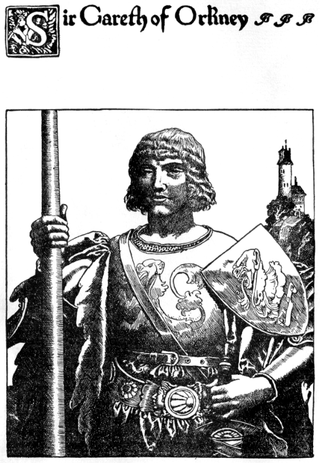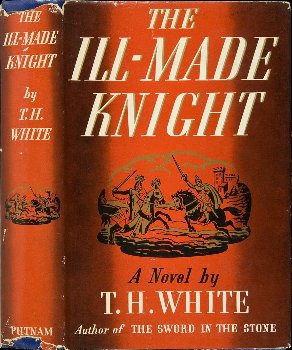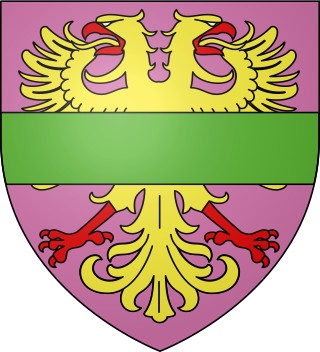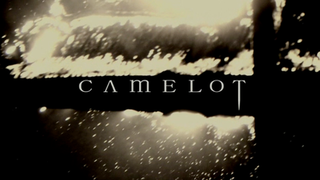Related Research Articles

Guinevere, also often written in Modern English as Guenevere or Guenever, was, according to Arthurian legend, an early-medieval queen of Great Britain and the wife of King Arthur. First mentioned in popular literature in the early 12th century, nearly 700 years after the purported times of Arthur, Guinevere has since been portrayed as everything from a fatally flawed, villainous and opportunistic traitor to a noble and virtuous lady. Many records of the legend also feature the variably recounted story of her abduction and rescue as a major part of the tale.

Idylls of the King, published between 1859 and 1885, is a cycle of twelve narrative poems by the English poet Alfred, Lord Tennyson which retells the legend of King Arthur, his knights, his love for Guinevere and her tragic betrayal of him, and the rise and fall of Arthur's kingdom.

Lancelot du Lac, also written as Launcelot and other variants, is a character in some versions of Arthurian legend where he is typically depicted as King Arthur's close companion and one of the greatest Knights of the Round Table. In the French-inspired Arthurian chivalric romance tradition, Lancelot is an orphaned son of King Ban of the lost kingdom of Benoic, raised in a fairy realm by the Lady of the Lake. A hero of many battles, quests and tournaments, and famed as a nearly unrivalled swordsman and jouster, Lancelot becomes the lord of the castle Joyous Gard and personal champion of Arthur's wife, Queen Guinevere, despite suffering from frequent and sometimes prolonged fits of madness. But when his adulterous affair with Guinevere is discovered, it causes a civil war that, once exploited by Mordred, brings an end to Arthur's kingdom.

Gareth is a Knight of the Round Table in Arthurian legend. He is the youngest son of King Lot and Queen Morgause, King Arthur's half-sister, thus making him Arthur's nephew, as well as brother to Gawain, Agravain and Gaheris, and either a brother or half-brother of Mordred. Gareth is particularly notable in Le Morte d'Arthur, where one of its eight books is named after and largely dedicated to him, and in which he is also known by his nickname Beaumains.

Bors is the name of two knights in Arthurian legend, an elder and a younger. The two first appear in the 13th-century Lancelot-Grail romance prose cycle. Bors the Elder is the King of Gaunnes (Gannes/Gaunes/Ganis) during the early period of King Arthur's reign, and is the brother of King Ban of Benoic and the father of Bors the Younger and Lionel. His son Bors the Younger later becomes one of the best Knights of the Round Table and participates in the achievement of the Holy Grail.

The Ill-Made Knight is a fantasy novel by British writer T. H. White, the third book in the series The Once and Future King. It was first published in 1940, but is usually found today only in collected editions of all four books of the novel.

First Knight is a 1995 medieval historical drama film based on Arthurian legend, directed by Jerry Zucker. It stars Sean Connery as King Arthur, Richard Gere as Lancelot, Julia Ormond as Guinevere and Ben Cross as Malagant.

Merlin is a 1998 two-part television miniseries starring Sam Neill as Merlin, recounting the wizard's life in the mythic history of Britain. Loosely adapted from the legendary tales of Camelot, the plot adds the antagonistic Queen Mab and expands Merlin's backstory before the birth of King Arthur.

Agravain is a Knight of the Round Table in Arthurian legend, whose first known appearance is in the works of Chrétien de Troyes. He is the second eldest son of King Lot of Orkney with one of King Arthur's sisters known as Anna or Morgause, thus nephew of King Arthur, and brother to Sir Gawain, Gaheris, and Gareth, as well as half-brother to Mordred. Agravain secretly makes attempts on the life of his hated brother Gaheris starting in the Vulgate Cycle, participates in the slayings of Lamorak and Palamedes in the Post-Vulgate Cycle, and murders Dinadan in the Prose Tristan. In the French prose cycle tradition included in Thomas Malory's Le Morte d'Arthur, together with Mordred, he then plays a leading role by exposing his aunt Guinevere's affair with Lancelot, which leads to his death at Lancelot's hand.
The Legend of Prince Valiant is an animated television series based on the Prince Valiant comic strip created by Hal Foster. Set in the time of King Arthur, it is a family-oriented adventure show about an exiled prince who goes on a quest to become one of the Knights of the Round Table. He begins his quest after having a dream about Camelot and its idealistic New Order. This television series originally aired on The Family Channel for a total run of 65 episodes.

The Goodies is a British television comedy series shown in the 1970s and early 1980s. The series, which combines surreal sketches and situation comedy, was broadcast by the BBC, initially on BBC2 but soon repeated on BBC1, from 1970 to 1980. One seven-episode series was made for ITV company LWT and shown in 1981–82.

Brunor, Breunor, Branor or Brunoro are various forms of a name given to several different characters in the works of the Tristan tradition of Arthurian legend. They include Knight of the Round Table known as Brunor/Breunor le Noir, as well as his father and others, among them another former knight of Uther's old Round Table and the father of Galehaut.

The Black Knight is a 1954 British-American Technicolor adventure film directed by Tay Garnett and starring Alan Ladd as the title character and Peter Cushing and Patrick Troughton as two conspirators attempting to overthrow King Arthur. It is the last of Ladd's trilogy with Warwick Films, the others being The Red Beret and Hell Below Zero based on Hammond Innes' book The White South.

The Candle in the Wind is a fantasy novel by English writer T. H. White, the fourth book in the series The Once and Future King. Written in 1940, it was first published in 1958 in the collected edition. It deals with the last weeks of Arthur's reign, his dealings with his son Mordred's revolts, Guinevere and Lancelot's demise, and his perception of right and wrong.

Siege of the Saxons is a 1963 British adventure film directed by Nathan H. Juran and released by Columbia Pictures. Starring Janette Scott and Ronald Lewis, the film is set in the time of King Arthur, but, as with many Arthurian themed films, the sets and style are from medieval England. The plot is also heavily influenced by Robin Hood.

Camelot is a fantasy historical drama television series created by Michael Hirst and Chris Chibnall for Starz. An Irish-Canadian co-production, the series is based on the Arthurian legend, and stars an ensemble cast led by Joseph Fiennes, Jamie Campbell Bower, and Eva Green.

Artus - Excalibur is a musical loosely based on the legends of the 5th/6th-century British monarch King Arthur and his fabled sword, Excalibur. The score is by Frank Wildhorn, with lyrics by Robin Lerner, book by Ivan Menchell, and arrangements and orchestrations by Koen Schoots. The musical had its world premiere at the Theater St. Gallen in St. Gallen, Switzerland on March 15, 2014.
Guiomar is the best known name of a character appearing in many medieval texts relating to the Arthurian legend, often in relationship with Morgan le Fay or a similar fairy queen type character.

King Arthur(Arthur Pendragon) is a legendary figure used commonly in comic books.
References
- ↑ "The Goodies On Location: Camelot". The Goodies On Location. Archived from the original on 9 December 2019. Retrieved 9 December 2019.
- "The Complete Goodies" — Robert Ross, B T Batsford, London, 2000
- "The Goodies Rule OK" — Robert Ross, Carlton Books Ltd, Sydney, 2006
- "From Fringe to Flying Circus— 'Celebrating a Unique Generation of Comedy 1960-1980'" — Roger Wilmut, Eyre Methuen Ltd, 1980
- "The Goodies Episode Summaries" — Brett Allender
- "The Goodies — Fact File" — Matthew K. Sharp